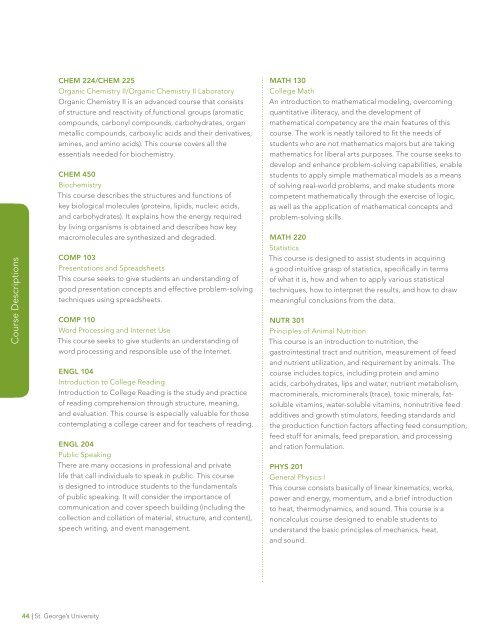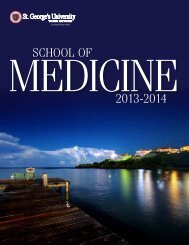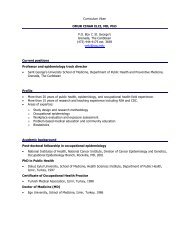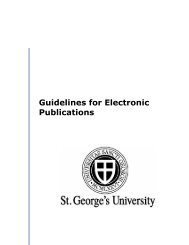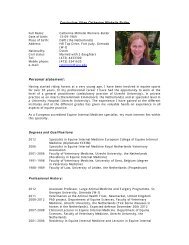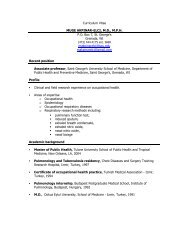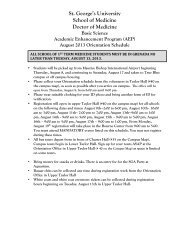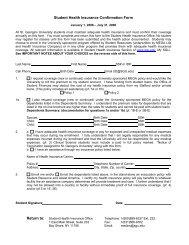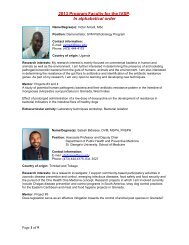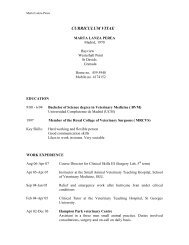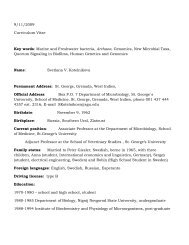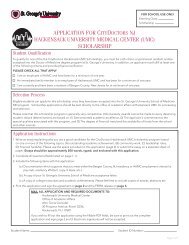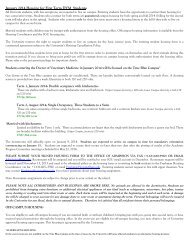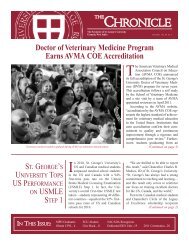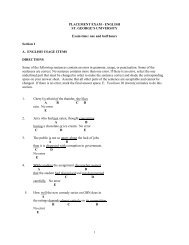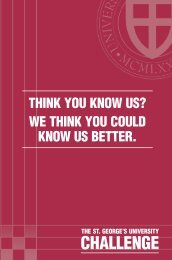SVM Catalogue 2012-2013 - St. George's University
SVM Catalogue 2012-2013 - St. George's University
SVM Catalogue 2012-2013 - St. George's University
Create successful ePaper yourself
Turn your PDF publications into a flip-book with our unique Google optimized e-Paper software.
School of Medicine<br />
Course Descriptions<br />
CHeM 224/CHeM 225<br />
Organic Chemistry II/Organic Chemistry II Laboratory<br />
Organic Chemistry II is an advanced course that consists<br />
of structure and reactivity of functional groups (aromatic<br />
compounds, carbonyl compounds, carbohydrates, organ<br />
metallic compounds, carboxylic acids and their derivatives,<br />
amines, and amino acids). This course covers all the<br />
essentials needed for biochemistry.<br />
CHeM 450<br />
Biochemistry<br />
This course describes the structures and functions of<br />
key biological molecules (proteins, lipids, nucleic acids,<br />
and carbohydrates). It explains how the energy required<br />
by living organisms is obtained and describes how key<br />
macromolecules are synthesized and degraded.<br />
COMP 103<br />
Presentations and Spreadsheets<br />
This course seeks to give students an understanding of<br />
good presentation concepts and effective problem-solving<br />
techniques using spreadsheets.<br />
COMP 110<br />
Word Processing and Internet Use<br />
This course seeks to give students an understanding of<br />
word processing and responsible use of the Internet.<br />
EngL 104<br />
Introduction to College Reading<br />
Introduction to College Reading is the study and practice<br />
of reading comprehension through structure, meaning,<br />
and evaluation. This course is especially valuable for those<br />
contemplating a college career and for teachers of reading.<br />
engL 204<br />
Public Speaking<br />
There are many occasions in professional and private<br />
life that call individuals to speak in public. This course<br />
is designed to introduce students to the fundamentals<br />
of public speaking. It will consider the importance of<br />
communication and cover speech building (including the<br />
collection and collation of material, structure, and content),<br />
speech writing, and event management.<br />
MATH 130<br />
College Math<br />
An introduction to mathematical modeling, overcoming<br />
quantitative illiteracy, and the development of<br />
mathematical competency are the main features of this<br />
course. The work is neatly tailored to fit the needs of<br />
students who are not mathematics majors but are taking<br />
mathematics for liberal arts purposes. The course seeks to<br />
develop and enhance problem-solving capabilities, enable<br />
students to apply simple mathematical models as a means<br />
of solving real-world problems, and make students more<br />
competent mathematically through the exercise of logic,<br />
as well as the application of mathematical concepts and<br />
problem-solving skills.<br />
MATH 220<br />
<strong>St</strong>atistics<br />
This course is designed to assist students in acquiring<br />
a good intuitive grasp of statistics, specifically in terms<br />
of what it is, how and when to apply various statistical<br />
techniques, how to interpret the results, and how to draw<br />
meaningful conclusions from the data.<br />
nuTr 301<br />
Principles of Animal Nutrition<br />
This course is an introduction to nutrition, the<br />
gastrointestinal tract and nutrition, measurement of feed<br />
and nutrient utilization, and requirement by animals. The<br />
course includes topics, including protein and amino<br />
acids, carbohydrates, lips and water, nutrient metabolism,<br />
macrominerals, microminerals (trace), toxic minerals, fatsoluble<br />
vitamins, water-soluble vitamins, nonnutritive feed<br />
additives and growth stimulators, feeding standards and<br />
the production function factors affecting feed consumption,<br />
feed stuff for animals, feed preparation, and processing<br />
and ration formulation.<br />
PHyS 201<br />
General Physics I<br />
This course consists basically of linear kinematics, works,<br />
power and energy, momentum, and a brief introduction<br />
to heat, thermodynamics, and sound. This course is a<br />
noncalculus course designed to enable students to<br />
understand the basic principles of mechanics, heat,<br />
and sound.<br />
44 | <strong>St</strong>. George’s <strong>University</strong>


